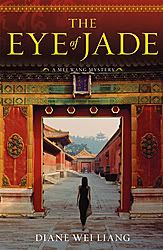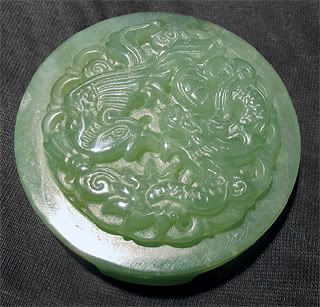 The Eye of Jade by Diane Wei Lang has a beautiful cover, and to be honest, that's what drew me toward it. It's all red and gold and absolutely gorgeous, and generally if that much attention is spent on a cover, it's safe to say that the actual book will be pretty good. Not so in this case.
The Eye of Jade by Diane Wei Lang has a beautiful cover, and to be honest, that's what drew me toward it. It's all red and gold and absolutely gorgeous, and generally if that much attention is spent on a cover, it's safe to say that the actual book will be pretty good. Not so in this case.It's ostensibly a mystery novel, with protagonist Mei Wang opening her own business as a private detective in China. Lang tells the reader that private detectives are illegal in China, which should add excitement to the plot, but sadly no one in the book seems at all concerned that Mei is living outside the law. The story opens with her taking on a case from a man named Shao, a case that has nothing to do with the rest of the novel and only leads to confusion later. Twenty-five pages in, there is still no hint of the artifact the dust jacket promises Mei will be commissioned to find, and there is no sense of the plot heading anywhere. There are flashbacks galore that seem like they're supposed to add depth to the character, but they're so vague and so out of the blue that the reader ends up more confused than enlightened.
Near the middle of the book, I found myself writing things like "WHAT'S THE POINT?" and "FOCUS?!?" in my notes. I thought maybe I had missed a previous book in the series and that's why I was confused (no such luck), I thought maybe I was the one not focusing, and I eventually just gave up and put the book down unfinished.
 Maybe I missed something. After all, Lang's native language is Mandarin, not English, and maybe her writing style has literary influences that I don't recognize and therefore didn't appreciate. Maybe I focused too hard on the mystery part of things rather than just taking the plot as it came and seeing how Lang worked things out. It's very possible that my total lack of enjoyment was my own fault, and not anything Lang did wrong.
Maybe I missed something. After all, Lang's native language is Mandarin, not English, and maybe her writing style has literary influences that I don't recognize and therefore didn't appreciate. Maybe I focused too hard on the mystery part of things rather than just taking the plot as it came and seeing how Lang worked things out. It's very possible that my total lack of enjoyment was my own fault, and not anything Lang did wrong.I think I understand why the book was written. With the recent mania for everything Asian, it makes sense that a Chinese woman might see what Sujata Massey, Amy Tan and Jhumpa Lahiri (not Asian, but same idea) have done and think she could do it. And Lang is probably right; there is a niche right now for Asian-inspired everything, and with the Olympics coming up in Beijing and the comparative lack of Chinese-inspired literature, sure, there's space for a Chinese writer.
 I also think that Lang wanted to use some of her own life for a story. Beginning writers are always told to write what they know. Since both Lang and her protagonist have been in labor camps, both of their fathers have died in them, and both struggle against Communist China in their own ways, I'm positive Lang took this advice. Other authors (see above) have done it with great success, but somehow Lang didn't take it beyond autobiography and make it into a really good story. I found myself wondering what Mei's past had to do with finding this artifact that is barely mentioned but presumably the point of the novel. Maybe if I had finished the book, I might have understood better, but suffering through 200 pages to get the answer didn't seem quite worth it.
I also think that Lang wanted to use some of her own life for a story. Beginning writers are always told to write what they know. Since both Lang and her protagonist have been in labor camps, both of their fathers have died in them, and both struggle against Communist China in their own ways, I'm positive Lang took this advice. Other authors (see above) have done it with great success, but somehow Lang didn't take it beyond autobiography and make it into a really good story. I found myself wondering what Mei's past had to do with finding this artifact that is barely mentioned but presumably the point of the novel. Maybe if I had finished the book, I might have understood better, but suffering through 200 pages to get the answer didn't seem quite worth it.That's why, despite getting why the book was written, I can't recommend it. Some critics are calling it exquisitely written, but since this book made me want to whip out a pencil and start rewriting it in the margins, I'd have to respectfully disagree. Steer away from this one, unless you have a passion for China or a lot of time to kill.




No comments:
Post a Comment